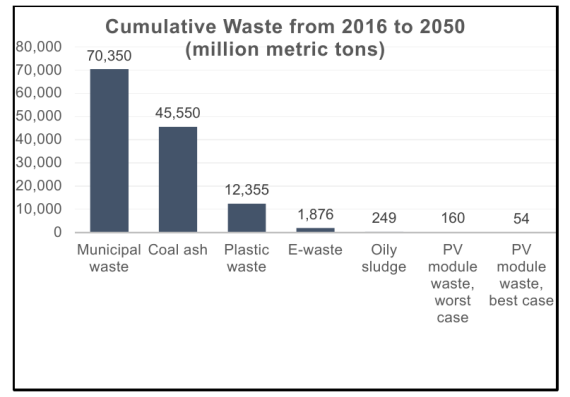Are solar panels generating too much waste?
What the science says...
Waste from solar panels is trivial compared to the waste generated by fossil fuels, with coal ash generating 300-800 times more waste, and oily sludge generating 2-5 times more waste than PVs.
Solar panels generate too much waste and will overwhelm landfills
"Solar panels pose a huge risk for overfilling the landfills." (How solar affects you)
The amount of waste that solar panels are expected to generate over the next few decades is trivial compared to the amount of waste that will be generated by fossil fuels. A study published in Nature Physics in October 2023 found that “35 years of cumulative PV module waste (2016-2050) is dwarfed by the waste generated by fossil fuel energy and other common waste streams.” Specifically, the study found that “if we do not decarbonize and transition to renewable energy sources, coal ash and oily sludge waste generated by fossil fuel energy would be 300-800 times and 2-5 times larger [in mass], respectively, than PV module waste.”1
Figure 1: PV module waste from 2016-2050 compared to other sources of waste. Source: The Sabin Center for Climate Change Law (visualizing data from Heather Mirletz et al. 2023).
In addition, although only about 10% to 15% of solar panels are recycled in the United States2, the U.S. Department of Energy has awarded funding under the Infrastructure Investment and Jobs Act for additional research and development for solar technology recycling.3 A 2024 study on solar PV recycling concluded that “PV recycling will reduce waste, and CO2 emissions, while contributing to a sustainable environment,” and that “[i]t is expected that the research for efficient PV recycling strategies will accelerate as the PV industry grows and as many more organizations and government work towards a sustainable future.” (Ngagoum Ndalloka et al. 2024)
Already, some companies have been able to recover 90% of solar panels’ mass in their recycling processes (Aman et al. 2015). One commercial recycling plant in France can recycle more than 95% of a solar module (Deng et al. 2022). Bulk materials such as glass, steel, and aluminum are recoverable through existing recycling lines4 (Heath et al. 2020), while certain semiconductor materials (tellurium and cadmium) can also be recovered at very high rates of 95% to 97% (Chowdhury et al. 2020). Valuable materials in the panels, including silver, copper, and crystalline silicon, are actively sought for the development of other products, including the next generation of solar panels.5 In addition, new companies are emerging with innovative technologies to recycle solar panels.
Footnotes:
[1] Heather Mirletz et al., Unfounded concerns about photovoltaic module toxicity and waste are slowing decarbonization, Nature Physics (October 2023).
[2] Allyson Chu, Scientists found a solution to recycle solar panels in your kitchen, Wash. Post (Jul. 5, 2023)
[3] Solar Recycling Research & Development, Office of Energy Efficiency & Renewable Energy, Dep’t of Energy (last visited Jan 21, 2025).
[4] U.S. Dep’t of Energy, Office of Energy Efficiency & Renewable Energy, Solar Energy Technologies Office, Photovoltaics End-of-Life Action Plan 11 (2022)
[5] Jon Hurdle, As Millions of Solar Panels Age Out, Recyclers Hope to Cash In, Yale Env’t. 360 (Feb. 28, 2023)
[Note June 7, 2025: updated one or more link(s) to archived version(s)]
This rebuttal is based on the report "Rebutting 33 False Claims About Solar, Wind, and Electric Vehicles" written by Matthew Eisenson, Jacob Elkin, Andy Fitch, Matthew Ard, Kaya Sittinger & Samuel Lavine and published by the Sabin Center for Climate Change Law at Columbia Law School in 2024. Skeptical Science sincerely appreciates Sabin Center's generosity in collaborating with us to make this information available as widely as possible.
Last updated on 7 June 2025 by Sabin Center Team. View Archives































 Arguments
Arguments






























Climate Myth...